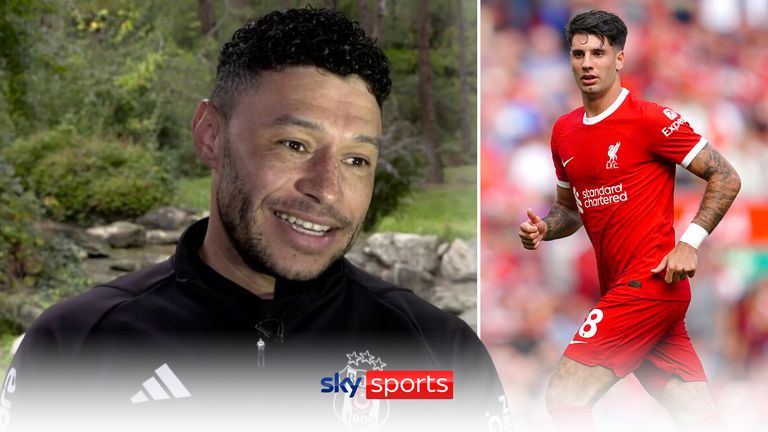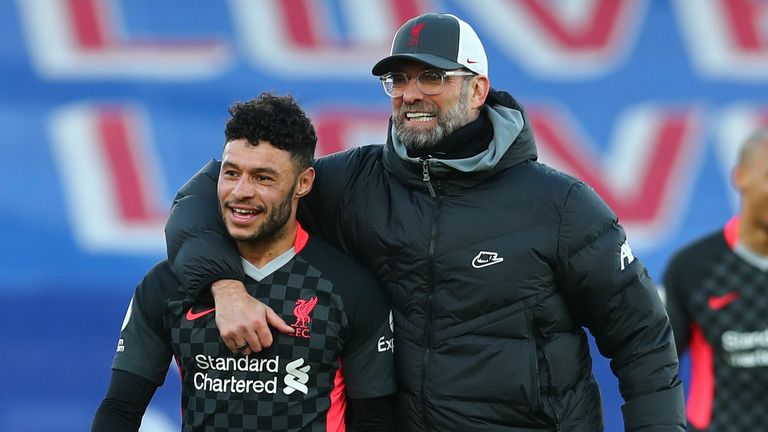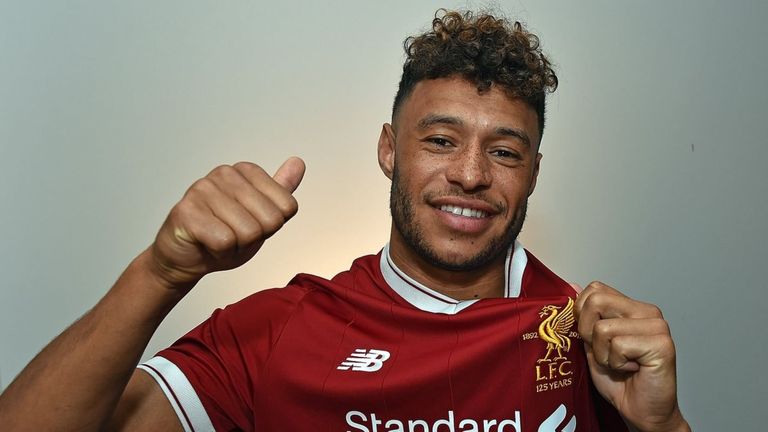Alex Oxlade-Chamberlain discusses his abrupt exit from Liverpool and life with Besiktas in Turkey; ‘Ox’ still admires Mohamed Salah and is impressed with Reds midfielder Dominik Szoboszlai; difficulties with living away from family and how the ‘mental side is tougher than physical side’
 Oxlade-Chamberlain: Besiktas forward discusses Liverpool exit and life in Turkey />
Oxlade-Chamberlain: Besiktas forward discusses Liverpool exit and life in Turkey />
Alex Oxlade-Chamberlain sits down with Melissa Reddy to discuss his move to Besiktas and how he is adjusting to life in Turkey.
Alex Oxlade-Chamberlain picked the ball up on the half turn on the edge of the centre circle and carried it forward – at speed, with the strength symbolic of his nickname. He shifted inside, taking three of five markers out of the game, but found himself in a more crowded area just outside the box.
Nihad Mujakic tried to block a shot, but he rolled out the red carpet for Oxlade-Chamberlain to fire a low rocket through his legs and into the bottom corner. That goal on Sunday was a throwback to the midfielder at his dynamic best, but it was also a warming moment having discussed such strikes with him earlier in the week.
In a cabin framed by waterfalls on Besiktas’ expansive training campus, Sky Sports News caught up on the past, dissected the present and imagined the future with Oxlade-Chamberlain.
- Watch free Premier League highlights | Get Sky Sports
- Stream the biggest moments on NOW
Does he get pangs when his explosive goals for Liverpool resurface on social media? “When I see them I think, ‘I need to do that again, what’s going on?’ They definitely live on in your memory, but when you’re still playing and then there’s a game on the weekend, it’s more looking at, ‘Okay, how did I do that? What did I do? How can I do that again at the weekend?’
“It is obviously nice to see those things when they pop up and just a little reminder that it’s you and your capabilities. If I haven’t done that for a while, it’s more a case of, ‘Okay, I need to get back to doing that because that’s a strength of mine.’”
Oxlade-Chamberlain doesn’t have to rely on past refreshers now. That goal for Besiktas, which secured a point at Ankaragucu, was how he recognises himself – how we recognise him – even if evolution is a natural and necessary part of the game.

Liverpool complete the signing of Alex Oxlade-Chamberlain from Arsenal.
“I see clips even from my Arsenal days when I was the sort winger that used to just want the ball to his feet and run at everyone. I don’t really play like that now, but, maybe I still can do that from time to time. You definitely evolve your game.
“I think I’m going through that process, for sure, where you have to figure out what your strengths are now, especially in this league, it’s a different league, it’s a different way of playing football. It’s figuring out what versions of yourself you can bring to the team.”
Watching Oxlade-Chamberlain in full flow on Sunday and continually impress after his switch to Turkey is to wonder why no Premier League clubs were willing to take a chance on him following the expiry of his contract with Liverpool.
The overriding answer is concern over his injury history, which wasn’t helped by his non-selection during his final few months on Merseyside.
Despite being fully fit, he was not involved in Liverpool’s matchday squad from mid-February, bar a rare seat on the bench or a few minutes in lost causes. There were conversations with several clubs in the winter window – Newcastle and Brighton among them – but a January exit was blocked and interest in him naturally faded as his game-time froze.

Image: Besiktas’ Alex Oxlade-Chamberlain, right, vies for the ball with Brugge’s Raphael Onyedika during the Europa Conference League group D game
Oxlade-Chamberlain spent the matchdays when he trained on his own and the entirety of the summer physically conditioning himself to rival the best midfielders in the league.
He gathered stats on distances covered, high-intensity sprints and the best performance data from lactate tests around the division to make sure he could match it over a series of months. Oxlade-Chamberlain presented it to clubs but they could not shake suspicion over why he was not playing at Liverpool.

Image: Alex Oxlade-Chamberlain with Jurgen Klopp at Liverpool
The way his spell at the Anfield side fizzled out is heavy, because his heart had been so full by the people and experiences there. Before suffering ACL damage in April 2018, ‘Ox’ was a driving force of Jurgen Klopp’s midfield, crowning Champions League nights with his glorious strikes. His goals came in clutch during the title-winning season too, and with silverware came some unbreakable bonds.
There are no hard feelings over how his six seasons with Liverpool ended: not being selected, silence, and then being alerted that a statement would be released about him, Roberto Firmino, James Milner and Naby Keita leaving.
Oxlade-Chamberlain holds on to the happier times, and, besides, there are new challenges now – not least trying to juggle being the father to a two-year-old son and playing a distance away in Istanbul.

Q&A with the ‘Ox’
Q: Alex, there are so many good memories, but a lot of players who have left Anfield recently said they were hurt or jolted a little bit by an abrupt sort of ending. Did you feel that as well?
A: I think there was maybe an element of that for a few of us. The one thing I would say from within the club, in terms of my team-mates, a lot of the staff, the backroom staff, that it was definitely the opposite, in that sense. It was really warm, you know, everyone gave us a great send off for weeks. I think they were the reason why when it came to leaving, that was what made it really hard, leaving so many really good people. I still speak to a lot of them now and still feel like I’m almost a part of that group, even though, of course, I’m not.
I think it’s more just the older you get, in football, you have these sort of moments where you realise things move on, things change. It is a business and I think it’s just changing of the guard and that’s how things go. I don’t really want to dwell too much on it or be salty about it. It’s the way things go in life. And I’ve had many years of having really great experiences and being treated really well at football clubs. So I can’t complain about that. There are obviously elements where you feel part of something, a part of a team and a club, and connected with the fans and everything. You expect a few things to happen and if they don’t, sometimes it could be a bit surprising, but yeah, I haven’t got any real hard feelings about that situation. It’s just the way things go.

Q: It’s just that human element that we spoke about. Again, you were so immersed in it…
A: Yeah, but, like I said, the people that really mattered to me were the people I spent every day with and they looked after me; physios, the kitchen staff, the fitness coaches, my team-mates and I couldn’t have had a better ending with those guys. So they’re the things that I’ll carry with me, and that’s the reason why I miss that place and will miss that group so much. But like anything in life, you move on. And I’m lucky enough to be in a really good environment now with a great bunch of lads again at a great club with great fans. You’ve got to be thankful for what you do have, I think at times.
Q: You’ve had a lot of games and a lot of training sessions with Besiktas, but do you ever still watch the Premier League?
A: Do you know what, I’ve watched more Premier League since I’ve been here than I did when I was in England. And it surprises me how much the players here watch it and we were told about it for years in the Premier League meetings and it’d get explained: ‘You’re watched all over the world’, so we have to think about our behaviour and how we act on the pitch, because you’re seen everywhere. Since I’ve been here I’ve realised how much the players here, especially the Turkish guys, do follow the Premier League, and the staff as well. We play a lot on Sunday, so always the Saturday games are on in the training ground and everyone sort of sits around and watches.
Q: Favourite Premier League player to watch at the moment? Is there anyone you’re looking at and thinking: wow!
A: I mean, obviously, I watch a lot of Liverpool games, the usuals: Mo Salah still scoring those goals. I’ve really enjoyed watching Dominik Szoboszlai. He’s sort of taken over from my sort of role and I’m really impressed with how good of a player he is and that he plays the game, how I sort of always want to play the game. I think he’s got so much ability, physicality and just his character as a player. I think he’s just what we needed in there. He’s been really, really good. Trent tells me a lot how good he is as well. Trent says his shots are better than mine. He’s got everything. I know what the other guys that I’ve played with are capable of so it was more interesting to see the new lads come in, what they can do. I’ve enjoyed watching him.

Q: You went straight into the action at Besiktas. Did it warm your soul after not playing football regularly for so long?
A: It did. When you don’t play for a while and then you’re thrown straight in and you’re playing, there was a part of me that was loving it and a part of me that was sort of trying to manage myself through that, that big shift. Obviously missing the pre-season as well. I did a lot of training or as much as I could back home with some really good people to prepare myself for when I came into a situation like this. But, of course, it’s not quite the same as playing pre-season games and training with 20 other guys. So there is definitely a level I had to quickly jump up physically and then slot in that sense. So, as much as I really enjoyed it and I wanted to get straight into it, there was, at the start, an element of me that was just through experience trying to manage myself through the first couple of weeks. We were straight into three games a week with the Europa Conference League games as well. So that was interesting. But I feel like I’ve got through that period and now I’m into the swing of things and it’s been good.
Q: You’re talking about load there, like managing your body, but mentally is there also that adjustment?
A: Yeah. I think the mental side is, for me, generally tougher than the physical side. We’re trained to just play every day. We’re trained to just be athletes and always on the go. The mental side of things can sometimes give you a little bit of a knock here and there. Just a bad result, you know, a couple of bad results when you want to win and you’re trying your best and the whole team is trying their best. They’re the moments that takes the strain and the travel as well. You know, when you play a game and then you’re traveling, flying away, and then you’ve got a midweek game and you’re flying away. That sort of mental side of things, leaving family. I feel like that can be the hardest thing. I think that’s been my life now for 13, 14 years. So I’m kind of used to that.
Q: It doesn’t really get easier though, does it? While there’s like drills and stuff for training or something you can do to perfect your left foot, for example, there’s no manual to help you cope mentally with everything around the game?
A: I think as a young player, you’re just in the swing of things and you’re just happy to be there and carefree and you’re playing football and it’s all about yourself. I think the older you get, you have children, a family and that’s when those small little changes make a difference. When you’ve been away for four days out the week, and you know, the little man’s at home. They’re still in England, so that’s a different sort of struggle where I don’t see them too much at all. I’m FaceTiming home, he’s asking me why I’m still playing football, when am I coming back… So they’re the sort of mental moments where it becomes difficult. And I think the older I’ve got, the more conscious I’ve become of other things in life. Unfortunately through injuries, I’ve had to sort of enjoy other things in life so I don’t go crazy basically. I think that’s a side of me that’s sort of developed in situations that I wouldn’t have wanted: looking at business endeavours or other things that I can do and start creating. I think then the older you get, and you get to 30, realistically it’s a case of how long you can keep going, for sure. When you have to think about what comes next because it does go really quick. If you make it to 35, that’s a sort of a good age. You still have a lot of life to live. We do sacrifice a lot of time where you can’t do quite simple things that other people can do because there’s always sort of a side effect to whatever you’re doing. Is that the best preparation for training tomorrow? Am I going to ruin my chances of the best recovery by doing X, Y and Z?

Q: Have you picked up any Turkish words yet? The swear words?
A: I don’t actually don’t know any swear words yet, that might have to come next . It’s just the general Thank you. Hello. How are you? Goodbye. Good morning. The thing is, I’m good at saying ‘hello’ to people, asking how they are. When I get something back, that’s when I’m finished. I don’t have anything more to say. It translates very differently, it’s been difficult, but I’m trying.
Q: I think you came here though with the right mindset. You were open to a new experience, to new cultures, to learning things, seeing the world differently. Has that outlook helped you?
A: Yeah, definitely. I’ve played for many years in England but over half the teams have always been made up of European guys or foreign guys from further afield. So I feel like being in a dressing room with a lot of lads that aren’t English has definitely helped me to come into a new country, There’s no other English lads here, but there’s a lot of guys that speak English. There was some part of me always that wanted to sort of experience football outside of the Premier League. That’s obviously easier said than done because when you’re playing in the Premier League, it’s an amazing experience and a great place to be. When the opportunity came and my situation at the time, it was perfect timing for me. I was definitely open to it. I had played a few times in Turkey in the Champions League and the atmospheres were everything. It’s always been really exceptional and that definitely drew me in as well. I knew I was coming somewhere where they really love football. The fanbase is big. It’s an exciting place in its own to play football.
Q: Did it give you more appreciation for the players that do leave their countries and move to, to then have to uproot yourself and begin a new life almost?
A: For sure. We sometimes take that for granted in England because a lot of the players do stay in the country and play in the country. Now, especially the young players, a lot of them are starting to leave, going to Germany to start their careers – it’s a new thing. In our generation it was not too often that players left or felt they needed to leave. I do have a bigger appreciation for the lads that sort of come from Brazil, I think places like that. I think this place in Europe is probably the furthest away from life back home in a way, like culturally and stuff. It’s very different. So the guys that have come from, you know, Brazil to England, I’m sure it’s a massive culture shock for them and that can just be a little bit unsettling in itself. The familiarity is different. You go to the shops and simple things like ham and cheese is different, the brands aren’t the same…

Q: What have you missed most from back home? Like getting into this shop and hoping to see something and it’s not there?
A: I went shopping early on a few times. I don’t go as often now because, honestly, trying to find small things like milk, like, it sounds stupid, but it’s hard to distinguish milk in Turkey for us because they have a drink called Iron and it looks like milk, but it’s like more like a yogurt-based thing. It looks exactly like milk in the shop. I must have bought that thing three times thinking it was milk. Now, I just don’t bother as much. I sort of tend to try and eat at the training ground. My driver is Turkish and he helps translate things for me and just reading things on the packets in shops…
Q: Who are you closest with here?
A: Milot Rashica spent time at Norwich, so you can connect on that front playing in England. Arthur Masuaku, Gedson, Omar Colley… There are a lot of really good lads. We have a little bit of a communication barrier, but you can tell when someone’s a really good person and you get on with them. I try to get involved with everyone.
Q: Do you still get to be a DJ here or not yet?
A: Not yet.
Q: No dressing room tunes?
A: We have a little bit of an issue – there’s a lot of Turkish music on that front. I’m getting used to it. It’s very different to what I listen to a lot. It’s not quite Rap and RnB but it’s good. Cenk Tosun takes control of that a lot of the time. There’s a lot of Afrobeats as well from the African boys, so I don’t complain. I’m a big fan of Afrobeats,
Q: You touched on the atmosphere and the football religion here in Turkey…
A: The biggest thing for me was the stadium, how energetic it is in the warm-up even. They’re singing songs, they call each player over to come and greet the fans and they greet you. It’s quite warming and welcoming. And then, if you’re doing well in the game, the support’s amazing. If we’re not doing so well, they let you know as well, which I don’t mind that. They sort of wear their heart on their sleeve here, for sure. It’s been a great experience so far. And we need to keep developing as a team and doing more because the sort of the support that they show us is amazing. I think we’ve got a group of players here that are good enough to repay them with good performances and a lot of wins.
Sourse: skysports.com